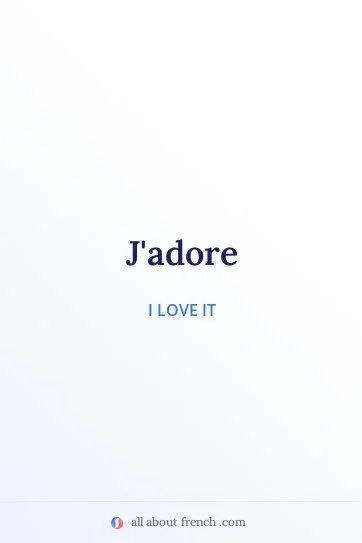
On this page, we are going to show you everything you need to know about the basic word "J'adore". This include a detailed guide of what it is and how you can use it in a normal conversation with an audio example. And that's not all, we also added useful informations like slow pronunciation audio, dialogue example and more!
Translation : I love it
Register : Neutral - Basic
Slow
Normal
IPA : / ʒadɔʁ /

The meaning of "J'adore" is a complex mix between "I really like" and "I love". We use it to express enjoyment about something or when we are asked about our preferences.
It will be more clear soon, but first, we need to clarify once and for all the "Does j'adore means I like or I love?" debate.
If you are talking about something (like hobbies, movies, food, etc.) there are 3 main options, in order:
But if you are talking about someone, you have the same options BUT IN A DIFFERENT ORDER:
There are 3 important conclusions here.
First, in French "J'aime" isn't always the most powerful word, on the contrary of "Love" in English. When talking about something other than a person, "J'adore" has more power.
Secondly, when romance is involved, there is only one way to express it: "Je t'aime". Using "Je t'adore" doesn't imply romantic feelings but a strong appreciation instead. (e.g. good friends or family members)
Thirdly, adding "bien" (good) after "Je t'aime" doesn't imply a stronger "romantic love" feeling, as we might think at first. That's even the opposite: it means there is no romance involved, actually it's even weaker than saying "Je t'adore".
That's why it's so confusing for English speakers... but as long as you follow these rules, it will be fine.
If someone asks you: "Do you like to read? " you can say "Oui, j'adore !" (Yes, I'm fond of it!). But if you are asked instead: "What do you like?" you can say "J'adore lire." (I'm fond of reading.)
Now, let's imagine you are visiting Paris and you see the Eiffel Tower for the first time, you might say: "J'adore !" (I love it!). You don't need to specify what you "adore", it's understandable with context.
Now let's see wider examples to make it crystal clear!
Dialogue
Tu aimes la pizza ?
Do you like pizza?
Non. Ce n'est pas mon truc, et toi ?
No. It's not my thing, and you?
J'adore !
I love it!
Learn French with Audio Stories
Learn French the easy way with our French - English
parallel texts with slow French audio
 Start Learning
Start Learning 